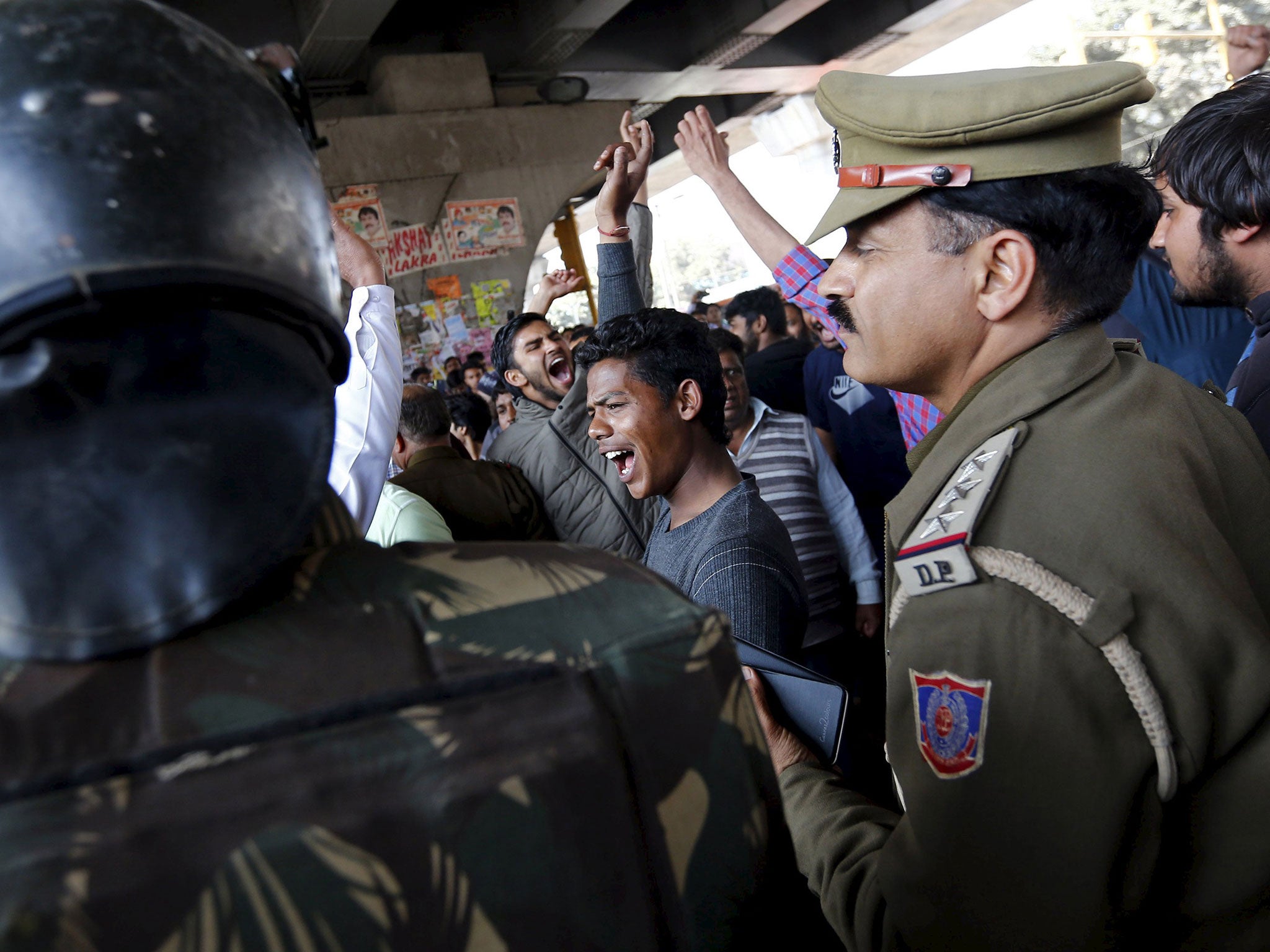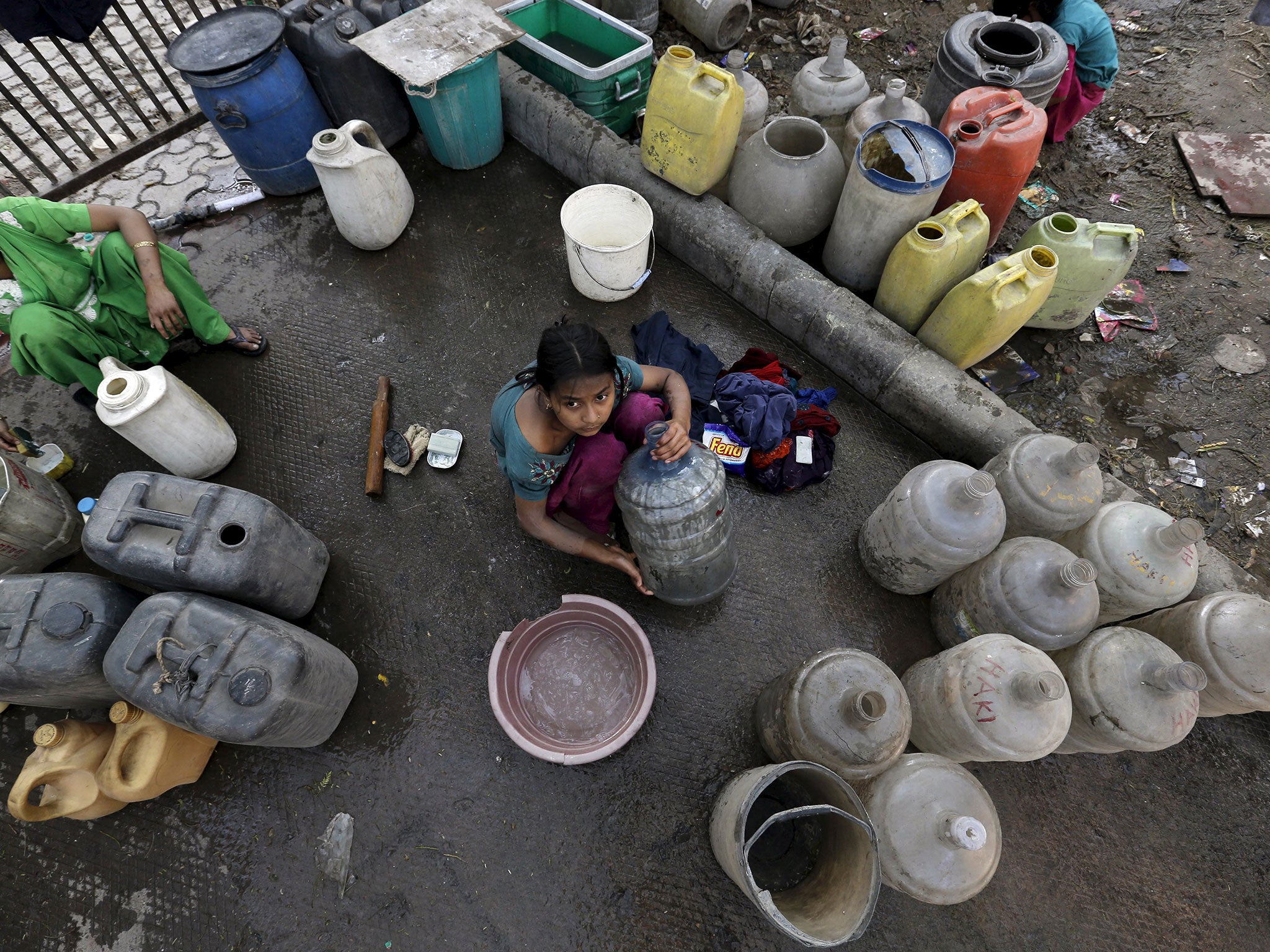At least 10 die as caste protests escalate in India over quotas for jobs and studies
The Indian capital is in the grip of a water shortage and protests have left 10 dead as the Jat community calls for access to jobs and college places protected by quotas for the disadvantaged. Leila Nathoo reports from Delhi

Violent protests have paralysed the north Indian state of Haryana leaving at least 10 people dead, triggering a water shortage in neighbouring Delhi, and renewing a debate about caste determining access to government jobs and college places.
Curfews have been imposed and thousands of troops and paramilitary forces deployed across the state with orders to shoot on sight, after protesters burnt buildings and buses, attacked the houses of ministers and blocked highways and major rail routes.
Trouble flared at the weekend after an eight-day agitation by members of the Jat community, who rank highly in India’s traditional caste system, but want eligibility for quotas reserved for lower castes which have faced past discrimination.
As Narendra Modi’s India speeds towards becoming the world’s fastest-growing economy, predicted to overtake China within a decade, the rioting underlines the growing frustrations of those who have failed to find jobs and opportunities despite strong growth, and instead see access to public institutions as a way of securing a better future.
Television footage of the worst-affected areas of Rohtak and Jhajjar showed gutted buildings, including a burnt-out car showroom, with troops patrolling the streets and army helicopters circling. In other parts, protesters continued to defy orders to stay off the streets with huge crowds blockading the main arteries into the state.
“Those involved in violence are being identified and action will be taken,” the Haryana police chief Yash Pal Singal told reporters. Jat leaders met the Home Minister Rajnath Singh and state officials on Sunday evening for talks to try to resolve the crisis, which police said had also left 150 people injured.

The Haryana government, which is run by the Prime Minister Narendra Modi’s Bharatiya Janata Party (BJP), indicated it was prepared to meet the community’s demands.
Under Hinduism’s caste hierarchy, a person’s occupation and social position is determined by birth, leaving those at the bottom unable to escape a life of menial work and low status. To make up for centuries of discrimination, India now reserves up to half of public sector jobs and places in state education institutions for the lowest castes and for other traditionally disadvantaged groups, collectively known as “other backward classes” or OBCs.
But the policy has been a source of growing resentment among groups which feel they have lost out on opportunities because of affirmative action. “Unless we are given reservation under the OBC category, we will intensify our agitation to other states,” Yash Pal Malik, leader of a Jat group at the forefront of the protests told The Hindu newspaper.
In Bahadurgarh, on the road west from Delhi, around 2,000 protesters occupied a motorway intersection and stopped traffic. “We are here to die,” said Rajendra Ahlavat, a 59-year-old farmer and protest leader. “We will keep going until the government bows to our pressure. There is no way we will take back our demands.”
Last summer, members of the influential and largely affluent Patel community in Mr Modi’s home state of Gujarat rallied with the same demands, with 500,000 people taking to the streets at the height of protests, which also turned violent. Both the Patels and Jats backed Mr Modi when he swept to power in India in 2014 on a platform of promising jobs and economic growth. Their clamour for relegation to “backward caste” status in order to secure an official role or college place highlights the fierce competition to get ahead in modern India.

As the latest protests crippled Haryana, with hundreds of trains cancelled and factories forced to close, the unrest also led to water shortages across the capital Delhi. After years of uncontrolled expansion and a huge rise in demand for water, the city of 16 million now depends on neighbouring regions for much of its supply.
Mobs damaged pumping equipment at the Munak canal, one of the city’s main water sources, causing taps to run dry across the city.
Delhi’s Chief Minister, Arvind Kejriwal, announced water would be rationed to prioritise hospitals and emergency services and that schools would be closed on Monday. “Delhi [is] facing an unprecedented water crisis,” he said.
Politicians from the federal and state government met Jat representatives in Delhi yesterday in a bid to restore peace. The Haryana BJP leader Anil Jain said the state was ready to meet the community’s demands. “We have decided in the meeting that Jats will be given reservation through a law in the next assembly session,” he told local media after the talks.
The Jat community forms about a quarter of the population in Haryana, a mostly rural state which is also home to the prosperous Delhi satellite town of Gurgaon, where many multinationals have set up base. If Jats succeed in accessing the quotas, it will be in contrast to Gujarat’s Patels, whose demands have so far been rejected and whose firebrand leader Hardik Patel was arrested on charges of sedition.
Join our commenting forum
Join thought-provoking conversations, follow other Independent readers and see their replies
Comments
Bookmark popover
Removed from bookmarks